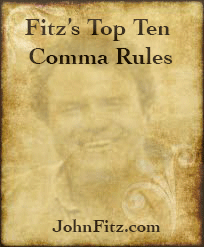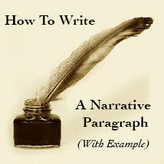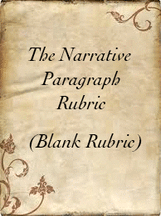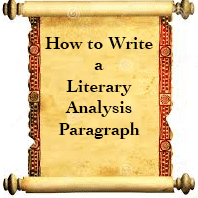|
Working in he Literary Analysis Paragraph Rubric, try to find a theme and a good quote that support theme and get at least through the Broad Theme/Narrow Theme/One-Two Punch in the rubric. And be sure to post your Walden Trip Reflections. Here is a video I made about how to write a literary analysis paragraph. It can't hurt to watch:) You can see that there is now a chatbox on my blog. Feel free to use the chatbox, but use it appropriately (not just for random conversations. You must use full sentences punctuated as correctly as you can, and you must sign in using your First name first name Last name initial: e.g. Owen J. If you see an inappropriate post please email me immediately . Remember: there is no such thing as privacy on the web! A student was once suspended from school for using the chatbox to anonymously post derogatory comments. [I'm speaking in my "firm" voice.] You are also welcome to put it on your blog on the top right of your sidebar. Here is the embed code. Notice my nifty use of the block quote! <!-- Begin ShoutMix --> Class One: Section one: Comma Rule #5, comment check and grade update
Class Two: (Tuesday) Walden Pond Trip: Bring iPads for notetaking, pictures, and reading.
Class Three: (Wednesday) Introduce the Literary Analysis Paragraph Rubric and Walden Essay.
Class Four: (Thursday or Friday)Continue working on Essay Paragraphs Weekend:
Journaling: Create one independent entry of any sort. Comment on classmate's Walden Trip reflections. If you don't want to cut and paste all of your Walden work, you can use this shortcut to create a pdf of your portfolio thus far: “Strong minds discuss ideas, average minds discuss events, weak minds discuss people.” ― Socrates 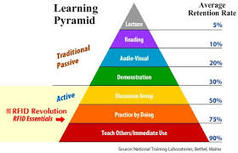 The Learning Pyramid The Learning Pyramid The Harkness Discussion is a method of conducting and evaluating group discussion which was developed at Phillips Exeter Academy. The teacher acts as little as possible, serving mostly as an observer. The students participate in the discussion as a team: this is not a competition. Everyone is expected to contribute in such ways as the following: - organizing, leading - summarizing, restating, clarifying - offering examples from the text - asking questions - commenting or giving an opinion - making a suggestion - asking for clarification - reacting to comments - analyzing the text, a comment, or the discussion itself - restarting the discussion - filling in a hole - arguing a point - asking for new information - asking for comments or reactions - making connections with other texts, situations, or discussions Since this is a team effort, there will be a team grade. The whole class will get the same grade, with two exceptions: students who do not participate at all will be marked down; other students who perform truly exceptional group-benefit feats - for example by “saving” or immensely uplifting a discussion that is going bad - will be eligible for independent work credit. A discussion for which everyone would receive an “A” would look like this: - Everyone participates, and more or less equally. - The pace allows for clarity and thoughtfulness, but not sleep. - There is a sense of balance and order: focus in on one speaker and one idea at a time. - There is an attempt to resolve questions and issues before moving on to new ones. - There is a clear sense of what the group has covered and how. - The loud do not dominate; the shy are encouraged. Everyone is clearly understood. - Students are animated, sincere, helpful. - The conversation is lively. - When the process is not working, the group adjusts. Those unhappy with the process say so. - Students take risks and dig for new meanings. - Students back up what they say with examples, quotations, etc. - All students come well-prepared. - The text, if there is one, is referred to often. The class will earn a “B” by doing most of the things on this list, a “C” by doing only half of what’s on the list (half the class is cruising), and a “D” by doing less than half (Everyone is cruising.) During the Harkness discussion, the teacher may choose to simply sit and make notes on the dynamics of the discussion, perhaps by using the list above as a rubric. It is often helpful to pause the discussion at ten or fifteen minute intervals for a “reality check.” The teacher may wish to project a transparency of the rubric onto the board and ask the class to self-assess. How are we doing? What do we need to do differently during the next ten minutes to make this a better discussion. Alternatively, the teacher may choose to assign one or more students as process observers and askthem to give feedback to the group at specified intervals. Sources: 1. "Harkness Discussion." Harkness. n.p., n.d. Web. 24 October 2014.
http://iws.punahou.edu/user/bschauble/ct/harkness.htm. Homework: Research and cite academic three responses and critiques of "Economy." Save your quotes and source.
Class Four: In-Class Harkness discussion of the whole of Economy. (first half)
Some nights I feel just plain old lucky. Reading your blogs tonight--on the tail end of two amazing Harkness discussions--I am more than impressed: I am grateful. Thank you! Section Two: You can play this on the screen, for I won't ben first period. NOTE: I will not be here first period on Wednesday. For section two: work on things you need to get done: Reading Journals, blog entries, commenting. We can hold off on Reading "The Fallacy of Philanthropy," which I think is interesting and thought-provoking! But you are welcome to plow ahead into that if you wish.
I have posted a weekly review podcast on the sidebar if you care to listen. “As if you could kill time without wounding eternity.”~Thoreau, “Economy” I sometimes wonder if you really grasp what you have and what is being offered to you. If Thoreau wants us to listen to any one piece of his advice, it would be to follow the bent of your own genius and make the best of your life and the opportunities that are literally falling at your feet. For some of you, reading “Economy" is mud-sucking work, and so in order to avoid the sweat and dirt that comes with real “thinking” you are trying to skim the surface and mollify (yes, look it up!) me instead of educate—and perhaps even enlighten--yourself. Reading Walden is a gift, not a chore. Which one of you if given a lottery ticket would stash it away instead of scratching the numbers? What if Ghandi had decided that reading Thoreau was just too difficult? What if Martin Luther King thought Thoreau was just some smug hypocrite who got his kicks making fun of old people and poor Irish railroad workers and put Thoreau back up on the dusty shelf where he belongs?
I read Thoreau and I teach Thoreau because he remains one of the few thinkers whose words resonate down and through succeeding generations, and what he said then is equally prescient, inspiring, and/or damning today. Thoreau's words roil me out of any rut I find myself in—and life, dammit, no matter how wealthy, happy, or settled you are—is going to be full of ruts, some that we dig ourselves and some that are laid out in front of us by fate or circumstance. You are old enough now to be preparing yourself to deal with those ruts, and if you don’t think so, look in the mirror. You’re not a boy anymore, so don’t act like one. Over the course of the next few weeks we will be working on or first essay, and I expect it to be the best essay you have ever written—an essay that you care about because you have put in the time to prepare yourself to write it—and you will take the time to craft it word by word to say exactly what you think and mean and believe Thoreau is trying to get across in the first chapter of Walden, titled “Economy.” If you don’t, you are just wounding eternity—and when that happens, you can't click undo. This week we will finish our reading of Economy, which will prepare us for our first full length essay of the year--a very important and involved undertaking which will require focused and disciplined attention to the details of each step of the process.
There are three sections left in "Economy:" namely: Education, Money and Work, and The Fallacy of Philanthropy--all sections and themes that are full of thought-provoking (and controversial) ideas. We will read and discuss each section, and you will be required to write three more reading responses, and you will be required to "show" active reading (including annotations) for each section in your ibooks texts. The essay will be titled: "A Response to Thoreau: The Major Themes and Assertions in "Economy." The essay will include personal narrative paragraphs which can (and should) draw on the work already in your reading journals, as well as detailed literary analysis paragraphs created using my rubric of the same name. We will begin our essay after our trip to Walden Pond on Tuesday, October 28. Each class has four meetings this week: Class One: Read, annotate and discuss "Education" Homework: Read and annotate "Money and Work." Class Two: Work on reading journal response to "Education" and "Money & Work". This can be a single post.
Class Three: Read, annotate and discuss "The Fallacy of Philanthropy."
Class Four: Write final reading journal response.
Journaling: Create one independent entry of any sort. Comment at least twice on classmate's blogs.
|
Archives
May 2015
DOWNLOAD
IBOOKS DOWNLOAD
RUBRICS Archives
May 2015
|
Fitz English
- The Crafted Word
- 8th Grade
-
9th Grade
- Rob Brower
- Chewy Bruni
- James Correia
- Christian Diprietrnatonio
- Anthony Duane
- Jack Eames
- Lucas Ewing
- Mickey Feeney
- Charlie Fitzsimmons
- Boyd Hall
- Hayden Galusza
- Zack Goorno
- Hal Groome
- Owen Gund
- Matt Hart
- Alex Hill
- Adam Jamal
- Kevin Kelleher
- Stephon KIndle
- Sidarth Modur
- Reid Monahan
- Patrick Ryan
- Spencer Pava
- Ben Sackett
- Ali Sheikh
- Max Solomon
- Eliot Stevenson
- Willie Swift
- Billy VanWalsum
- Conor Zachar
- Resources
- Poemminer
- Balladmonger
- Short Stories
- Novels
- Grammar
- Punctuation
- Rhetoric
- Multi-Media
- Forums
- Vocabulary
- Essays
- Rubrics
- Untitled
- Portfolio
- Banner
- Link
- Test
- Blog
- qjdqopsCJP
- Product

 RSS Feed
RSS Feed
